Liz Richter shown above with her father George Weber and Boone and Crockett caribou.
Liz Richter has had a difficult time getting anyone to take her hunting. That’s probably going to change now.
The 39-year-old widowed mother of two from Zimmerman, Minnesota recently became a proud member of the Boone and Crockett Club after taking a Central Barren Ground Caribou with Webber’s Lodges at Baralzon Lake, Nunavut in 2015 that measured 368-2/8 points. Her caribou was officially accepted by Boone and Crockett for the 30th North American Big Game Awards 2016-2018 on August 12, 2016.
Liz’s hunt was never about the rack. She’s not a trophy hunter. She was just trying to fill the freezer with meat for the winter. But ‘Carl the Caribou’ is now mounted on the wall in her house as a reminder that she can get the job done when it comes to providing for her family.
“My kids nicknamed him Carl,” said Liz. “I let them do it. I was thinking that was weird, because we were still eating him, but it just stuck. People come over now and they’re like, ‘Oh, Hey Carl.'”
Liz’s caribou was only the second big game animal she had ever taken as a hunter, and not because she was a bad shot. She’s actually 2/2 in that department. She took a doe earlier in the year after finally finding someone to take her on a deer hunt. It was simply a lack of hunting opportunities.
Liz grew up in a hunting/fishing family and spent a lot of time with her parents and grandparents, but it was mostly fishing. She did come close to hunting once as a teenager with her father George Weber.
“Basically I walked the field with him on a pheasant hunt and he let me touch the gun,” said Liz. “That was it, so it wasn’t really hunting. Usually it was just me going out in the field so I could use my driving permit to practice. I’d drive down the country roads, put it reverse and backup. I was afraid to get lost. The boys did most of the hunting and the fishing. I would fish too, but not as much. I would be in the cabin doing girl stuff.”
Liz started to get more interested in hunting in her late teens and twenties but no one seemed to take her seriously.
“I was excited about it,” she said. “Just being out with nature and trying to get food for the family. I really wanted to try deer hunting. I liked the idea of getting a deer, taking care of it and filling the freezer. So I just kept trying to find people that would take me. My Dad didn’t deer hunt and I really didn’t know anybody. Everybody I asked said, ‘Oh, it’s just the guys, we do that, maybe some other time.'”
Liz finally got a break in her pursuit for a hunt from Jeanne Avendt, a friend she’d taken fishing at their family cabin in Eagle River, Ontario, Canada. Jeanne knew Liz had always wanted to go deer hunting, and she had a connection to a lady with some deer-laden farm land.
“We’re going to go hunting this weekend,” said Jeanne. “Go get a tag.”
“Really!” said Liz, who now needed to find a gun.
“I asked my Dad if he had a gun I could use to go deer hunting,” said Liz. “He just kind of laughed at me and said, ‘Who are YOU going to go deer hunting with?'”
She explained that Jeanne knew a lady who owned some farmland 10 miles up the road. The woman didn’t want a bunch of people hunting on her property, but she allowed one older gentleman to hunt the land as long as he brought female hunters with him. She said it was considered a man’s sport and she wanted girls to be able to learn to hunt.
“I borrowed my Dad’s moose rifle,” said Liz. “We went out to the field and half an hour later I shot this huge doe. I learned how to gut a deer and we processed it ourselves. Jeanne and her husband John knew how to do everything. They’re very self-sufficient. I want to be more like that. I filled my freezer.”
Liz relayed the details of her successful hunt to her Dad, and that led to an unexpected Christmas surprise.
“What would you think about going on a caribou hunt?” said George.
The next thing Liz knew it was early September and she and her father were in Nunavut standing 90 yards away from a “humongous caribou.” Of course, it wasn’t quite as simple as that. First of all, she was the only woman among 12 men in caribou camp.
“It was great,” said Liz. “The food was wonderful and we had excellent accommodations. They had two tents with two groups in each tent. My Dad and I were really lucky. We bunked with Kevin Beasley and his cameraman Jake Thompson from the Canada in the Rough TV show. And everybody was really accommodating.
“It was kind of funny because the first night at dinner everybody just looked at me like ‘Ladies First’. And I said, ‘Nope, I’m on my hunting trip. Can’t I just be a Dude?’ And they were like ‘No, No, No, you’re not going to win this one, Ladies First.’
“So I didn’t fight it, but I remember when we first pulled up to the airport, the other hunters kind of looked strangely at us. We’d all seen other at the hotel but we hadn’t talked to each other, so we had no clue who was going on the trip. I think they kind of thought, ‘Ugh, is that a woman?’ but none of them said anything like that to me. They were so nice. They answered any questions I had and they helped us make sure that our rifles were sighted in.”
Liz wasn’t quite sure what to expect on the actual hunt, but it wasn’t long before they were out on the tundra with their guide Thomas looking for caribou. The spotted a small herd on a ridge far in the distance, including one huge bull which Liz pointed to.
“That’s the one,” she said to Thomas.
“Nope,” he said. “Too far away, can’t get it.”
Thomas was right when he said that the caribou were too far away, and there was also a lake between the hunters and their quarry, but Liz was persistent. She knew this was the one. This was the caribou she wanted to be her first.
“So we just sat and waited,” said Liz. “And the animals got closer, and closer, and closer. Then they bedded down and Thomas asked me if I really wanted that one, and if I was up for a walk.”
Of course Liz answered with an emphatic “Yes!” and her Dad said “Let’s do it.” So off they went for a 2 1/2-mile jaunt across the tundra.
“It was an insane walk,” said Liz. “But the caribou I wanted just happened to be on the other side of the lake so we had to walk through all kinds of stuff. We were sinking up to our boot tops in some places and crunching branches in others, but the caribou didn’t move. They were still bedded down when we got over there and we just crept up on them. It was late on the first day and we got really close, within about 90 yards.”
“Are you ready to shoot your first caribou?” asked Thomas.
“Yes,” said Liz.
“Then get it done,” said Thomas.
“I lifted my rifle and shot and it was just insane,” said Liz. “It went down and my heart was racing. I was excited and I was scared and I was nervous and I was worried that I didn’t hit it. It dropped in an area where the grass was high and we couldn’t see it. So Dad and I walked up and saw that it was done.
“It was just so amazing to me that I was able to walk this terrain with these men who had been hunting their whole lives. And that this amazing animal was there and they let me shoot it. This was a trip my Dad bought and paid for, so he could have easily taken that shot.
“It was so cool. I went from begging people to take me hunting, to getting a doe and ‘Ok she can do this,’ to my Dad taking me on this amazing trip and getting a caribou on my first shot. I think I’ve only taken two shots at big game animals in my life and I got both of them.”
The trio dressed the caribou and began the long journey back to camp. Liz carried meat in her backpack, her Dad carried the rack and Thomas carried the hind quarters. They arrived back at camp almost two hours past curfew and everyone was out on the porch to greet them.
Then they saw the rack.
“Way to go George!”
Liz didn’t say a thing, but her father did.
“‘Don’t say anything to me. It was Annie Oakley over there. She got it. And she was freestanding.”
There were high fives all around as the group cleaned up for dinner, and Kevin Beasley of Canada in the Rough made a point of talking to Liz about the size of her caribou’s rack.
“You know this is a really big deal right?” said Kevin.
“Yeah, I know it is,” said Liz. “I’m super excited. I can’t believe I got my first caribou. It’s only the second large game I’ve ever fired a gun at.”
“No, no,” said Kevin. “It’s a really good rack.”
“It is?” said Liz
“You didn’t know that?” said Kevin. “This is like a Boone and Crockett big deal.”
“And the guys heard this and they’re like, ‘Oh My Gosh,'” said Liz. “Then they said this is what this is, and you need to get this measured. You need to submit that, and then I thought, this is kind of cool, and I was crying even harder. I was just so excited. You know they could have not said anything to me and I would have gone my whole life not knowing. I don’t think there’s anything that could ever top this. It was just that cool.
“It was a real privilege to be able to do that and to know that I could call my boys as soon as I got home and say ‘Mom has meat coming home to fill the freezer.'”
Liz has two sons, Chase (15) and Owen (10), that had been fishing since they were young. They’d done target practice with BB guns, practiced with a bow and arrows, and participated in some squirrel hunting. Her older son is autistic, so she said they hadn’t done a “whole lot of gun stuff” yet. When they can both take the hunter safety class she plans to get them more involved, but they’ve both walked the fields with her.
She was a proud Mom.
“If you look back in society different cultures have it differently,” said Liz. “A lot of the time the men were the hunter gatherers. The women stayed home and they cooked and they raised children. I always thought that was kind of silly. Girls can do anything. I don’t necessarily have a problem with it, but what bugs me is that if a girl really wants to go hunting, it shouldn’t be that hard to go out and do it. But it seems like if you don’t know people with land, it’s kind of hard to get into. If you’ve got a lot of money and you can go on a trip, like the one that my Dad took me on, that’s great, but to normal people…
“Or like in my situation with my husband passing and a lot of kids coming up to my sons and saying, ‘Well you’re the man of the house now and you’ve got to take care of your Mom.’ The situation was so heartbreaking, that people were putting this responsibility on my children, especially my oldest son, having special needs. That’s a lot of pressure to put on a child.
“I felt that I needed to prove to them that I could do anything a man could do, and that even though their Dad was gone, and that’s a horrible, horrible loss, that I’m still going to take care of them. And this caribou hanging in my house, it’s kind of reminder to them every day, that no matter what, their Mom is going to walk through miles and miles of terrain and do what she has to do to make sure they have food on the table. I mean, it’s not like we’re in dire straits, like we’re starving here, but it’s kind of a symbolic thing that lets them know I’m going to do whatever it takes to take care of them.
Liz thinks everybody should have the right to choose what they want to hunt for, and that if they want to hunt it’s their right to do so. Personally, she hunts for food. If a trophy comes along that’s a bonus. It’s not her main objective. On her aforementioned deer hunting trip she didn’t see any bucks, but she got a really large doe.
“Certain animals you want to protect,” said Liz. “Up there, you don’t want to shoot females or young ones. But with the deer here, we’ve got a population that if you take a doe it’s not going to bother the population. I think every situation is really different. Some people were asking me why I didn’t wait for a buck. I said, ‘Well, you can’t eat the rack dude. I’m filling my freezer up on this trip.'”
“I think it’s becoming more acceptable for women to go hunting. Guys are becoming more welcoming to taking women with them and teaching them, which is great. I say just ask people, be annoying, and keep asking until you get a yes. If you really want to go, eventually somebody’s going to let you. I honestly couldn’t tell you how many people I asked.
“You have to be persistent. People know you want to do this and you never know who you’re going to talk to that’s going to have the ability to take you under their wing and show you what to do. I live in a small town north of the city, but a lot of people there grew up with hunting so they know how to go about finding land to hunt on. And even though I came from a hunting family, it was pheasant hunting. They didn’t hunt deer, so I had no idea how to go about it.
“You’ve got to know how to get permission and find the lands to go on, and to know how to spot whether they are going to have a good food source. Game in different areas tastes different, depending on their food source. I’m lucky that where I went the deer mainly eat corn, so it’s really good venison.”
Liz says she still gets a high talking about her caribou hunting trip, and from all the new people she’s encountered because of it. There are also bragging rights. She lives in a small town and some of the guys around town know about her quest to become a hunter. When her name comes up in the conversations her girlfriends are quick to back Liz up with a few digs into the male set.
“You know, she’s got a Boone and Crockett caribou,” said one. “So she’s probably a better hunter than you.”
“I get embarrassed,” said Liz, “But I smile. It’s like, okay, yeah, I’m kind of cool. I’m kind of a big deal. But you know. I’m not. I was just in the right place at the right time and everything just fell into place. It’s not like I’m one of those girls that goes out and makes everything happen. Half the time I don’t even know what I’m doing, but I’m trying. It was just something I had to do, for my kids.
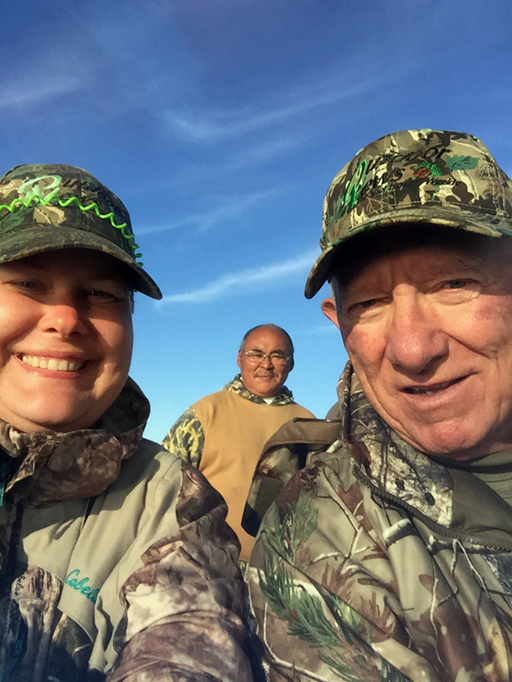
Caribou hunt boat selfie. Liz Richter with Dad George Weber. Guide Thomas Alikashawa in background.
“I know many of my friends are not hunters and some are very against it but I would just like to say that this Caribou fed my family for nearly a year,” said Liz via email. “And the additional meat that I was not able to bring home went to the Native community freezer to help feed the elders that are no longer able to hunt for themselves.
“I worked hard walking in difficult terrain and showed my boys that I can provide for them. I surprised some of the seasoned hunters who were on the trip with me and proved to myself that I am a strong woman. I learned so many new things about another culture and have priceless memories of quality time spent with my Dad.
“Thank you to Russ (Mehling) and Thomas at Webber’s Lodges, and everyone else who helped make this the trip of a lifetime. Thomas was an amazing guide. And it was pretty special to share the hunt with my Dad. I’m so lucky to have his encouragement and support. I hope that by sharing my experience some anti-hunters will maybe see that there is another side to hunting.”
It’s not just about the rack.
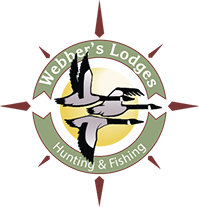
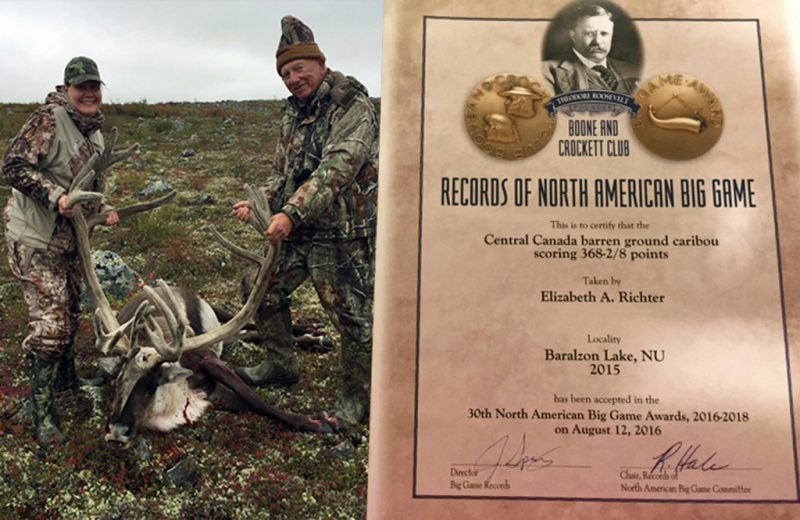
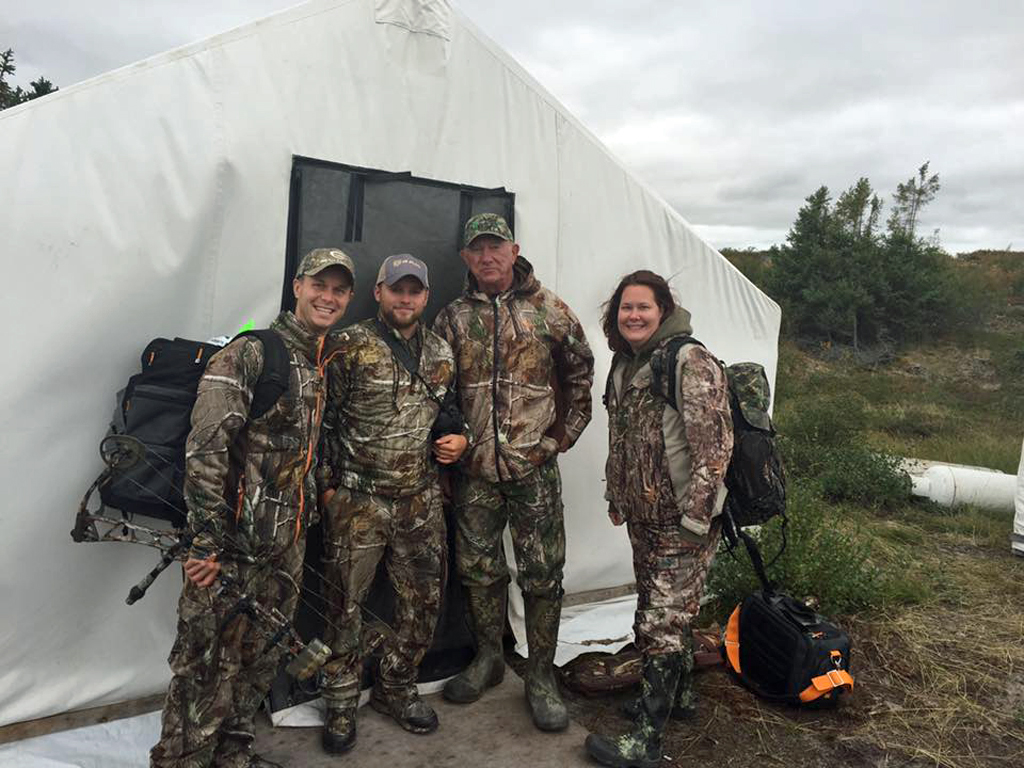
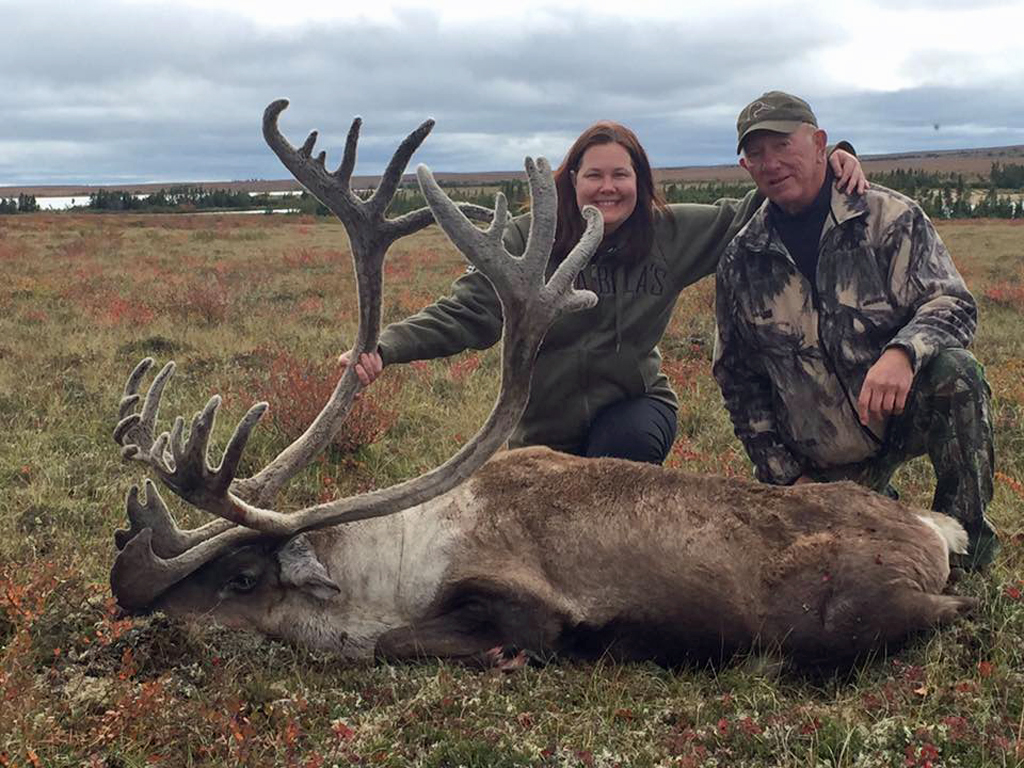
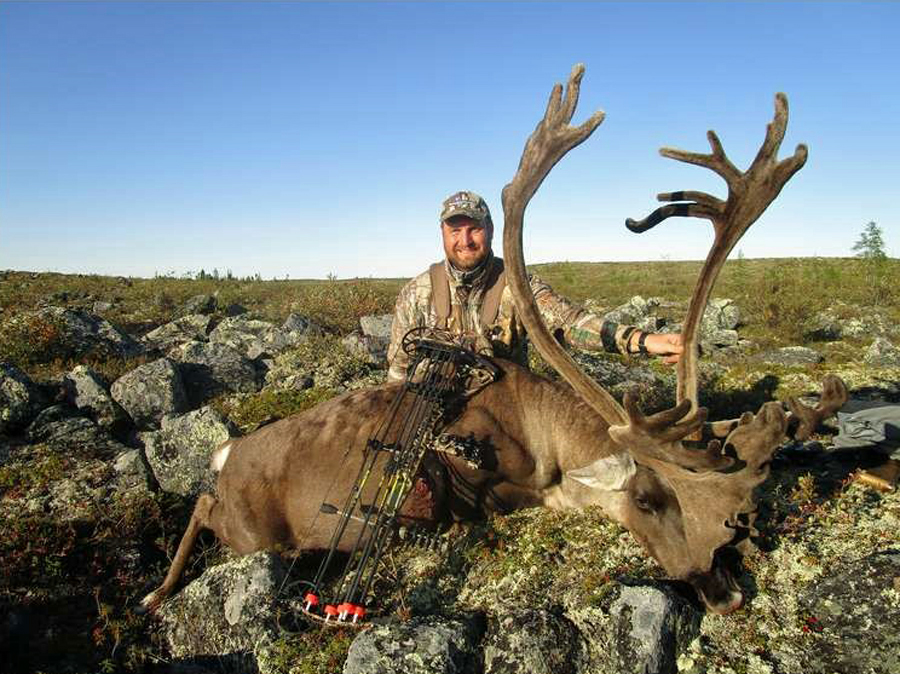



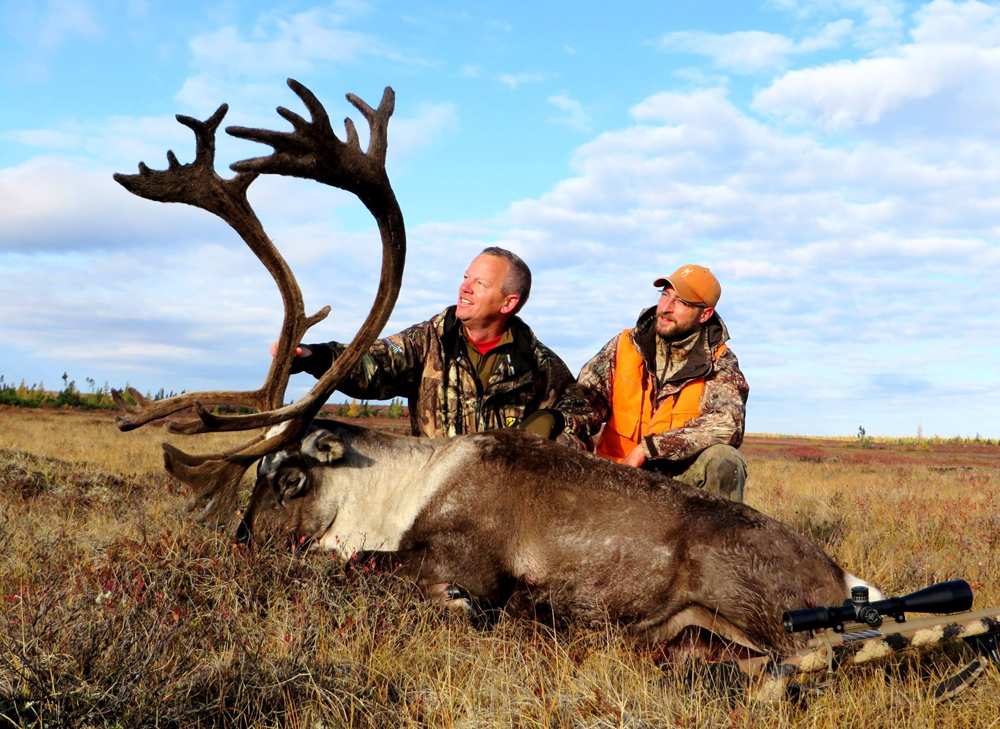
Leave A Comment